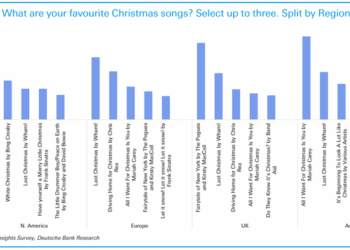
France is a persistent violator of European Union debt-control rules, taking the great place of dishonor once held by former fiscal basket-cases such as Greece. The Europeans take a narrower view of sovereign debt than Americans do, and the markets are more skeptical of the ability of European countries to carry large debt loads: As a share of GDP, France’s government debt is less than that of the United States (about 116 percent for the French vs. 123 percent for les Américains), and so, in that respect, France is being punished not for its absolute debt load but for the political chaos and irresolution that demonstrates and confirms the fundamental French disinclination to deal with the problem.
France’s deficit in 2024 was 5.8 percent of GDP, the largest since World War II and nearly twice the 3 percent limit imposed by the European Union. In comparison, EU countries ranging from Greece to Denmark ran modest surpluses in 2024, with the Danes enjoying a surplus amounting to 4.5 percent of GDP. (By comparison, the United States would have to run a surplus of about $1.4 trillion to match that performance; instead, the U.S. government ran a deficit of about $1.8 trillion in fiscal year 2025.) France’s persistent deficit is not great in straightforward economic terms, but, more important, it is a signal that France’s political leadership is unable or unwilling to meet its obligation to impose reasonable fiscal discipline. For the skittish debt markets, it does not matter whether Paris could sort itself out—it matters that Paris apparently won’t. Lenders care about whether a borrower can repay a debt, but they also worry about whether a borrower is inclined to do so. Willingness to make good on obligations matters as much as ability to do so.
Six out of seven French voters disapprove of Macron’s job performance. One analyst describes the public attitude toward the president as “hatred.” And, as such, he does not have the clout to impose his will on the legislature, where power is divided among the left, the right, and the center, but it gets pretty complicated pretty quickly: Lecornu survived his most recent (as of this writing!) no-confidence vote thanks in part to support from elements of both the Socialist Party and the much-diminished center-right Republicans. (If you think our Republican Party is useless at teats on a boar, check out France’s Groupe Droite Républicaine.) The current system of French government, a legacy of Charles de Gaulle, is designed to avoid this kind of paralysis, but it apparently is not fit for purpose.
There is a structural lesson in that for Americans. As our presidency continues on its way from Gaullist to Napoleonic, American governance is becoming less stable, less predictable, less coherent, less effective—more autocratic, more chaotic, more sclerotic, more dangerous—than it was under our original constitutional settlement, when Congress was the supreme branch and the executive charged with executing Congress’ laws rather than making its own up on the fly. Goodness knows I am not the biggest fan of capital-D Democracy in its cultic form—the populist-majoritarian notion that if 50 percent plus one of the voters decide to nuke the moon that makes it a good idea—but in that great eternal contest between king and parliament, parliament generally does a better job.
I don’t want to go fishing in Jonah Goldberg’s pond here, but there are real operational problems with the high-progressive model of governance, which combines democratizing tendencies on one hand (e.g., wrecking the political parties with the primary system, expanding referenda and ballot initiatives, etc.) with anti-democratic tendencies on the other (shifting real power from legislative committees to legislative leadership, in the Pelosian mode, and from the legislature to the executive, in the Wilsonian mode, while empowering supposedly disinterested experts to impose empiricist rationality on both market outcomes and democratic outcomes, etc.). Some of you may remember that in the late 20th and early 21st century there was a robust movement afoot, mainly among Democrats and center-left types, to expand the power of the presidency and make the office even more powerful by extending the length of terms and increasing executive discretion—indeed, the notion that a less-accountable president would be a better president, because he would be liberated from thinking about reelection, is very much with us, as this 2024 column from a political science professor exemplifies. The underlying assumption here is that presidents know what needs to be done and need to get things done but are prevented from doing so by niggling political concerns.
Arthur Schlesinger Jr. was answering similar arguments way back in 1986:
The basic argument for the one-term, six-year Presidency is that the quest for re-election is at the heart of our problems with self-government. The desire for re-election, it is claimed, drives Presidents to do things they would not otherwise do. It leads them to make easy promises and to postpone hard decisions. A single six-year term would liberate Presidents from the pressures and temptations of politics. Instead of worrying about re-election, they would be free to do only what was best for the country.
The argument is superficially attractive. But when you think about it, it is profoundly anti-democratic in its implications. It assumes Presidents know better than anyone else what is best for the country and that the people are so wrongheaded and ignorant that Presidents should be encouraged to disregard their wishes. It assumes that the less responsive a President is to popular desires and needs, the better President he will be. It assumes that the democratic process is the obstacle to wise decisions.
Both Schlesinger and the argument to which he was responding are at least partially wrong. We the People, bless those thick American skulls, are about as likely to be wrong about any given issue as right about it, but their wrongness is not randomly distributed and, in that way, partly self-correcting. Popular wrongness tends mainly to point in the same direction or directions: in favor of more spending and more benefits; against taxes to pay for that; reflexively against liberalism across the board, from free speech to free trade; in favor of using the power of the state to disadvantage or humiliate the very long list of people they hate; in favor of violence and aggression until these become wearisome or expensive. As the economist Bryan Caplan argues, the American system slightly advantages the policy preferences of high-income people, who lean more in the direction of his own libertarian views than does the median voter—and this, he argues, is “what makes democracy tolerable.” Caplan may be intentionally provocative at times, but his analysis is largely correct. (Speaking of which, Caplan has a new book forthcoming, to be titled Unbeatable: The Brutally Honest Case for Free Markets. Here is his lecture on the theme.) The notion that elections are a check on the president assumes that what is intelligent or good is also what is popular—which is, of course, the basic problem with that capital-D Democracy I mentioned earlier. Voters are about as likely to reward presidents for bad policies as for good ones.
There are other problems with majoritarian safeguards: Donald Trump, to take an obvious example, has twice been elected without a majority. Chuck Schumer and Mike Johnson, two of the most powerful men in government, represent no national majority.
But removing or reducing democratic checks, or loosening other effective constraints on the executive, does not do the job, either. Presidents thus liberated do not suddenly become selfless philosopher-kings with no interests of their own, because reelection is not the only appetite at work in the political belly. You will have noticed that lame-duck presidents in the United States—or in France—do not suddenly become more courageous, more intelligent, more reasonable, more sensible, or more responsible. Many of them become quite the opposite. Donald Trump isn’t using the U.S. military to murder seafaring South Americans because he thinks this is going to help him or anybody he actually cares about (helpfully for him, that is a very, very short list) win an election. He is using the U.S. military to murder South Americans because he wants to murder South Americans and does not have the skill or the sack to do it himself.
Macron has spent the last few years jet-setting around the world pretending that France is still a major global power capable of sorting out big problems in the Middle East or Ukraine because that is how he prefers to spend his time and because he thinks that this is the way one ends up being remembered as a great statesman, and Macron apparently does not want to be remembered as what he is: a reasonable, capable technocrat. I happen to like and appreciate reasonable, capable technocrats and would happily march Donald Trump and his whole stinking gang off to whatever desert island you like in exchange for a few good technocrats—or a stack of old newspapers, for that matter, or a kind word—but you get what I mean.
Which is to say: The French did not fix what is wrong with their political system by making their presidents more powerful. The French are not going to fix their political system by humbling Macron or by driving him from office and thus humbling the presidency itself.
Our problems are different. But the United States is not going to fix what is wrong with our system by making the presidency more democratic or less democratic. Executives of whatever character—from democratic to monarchical—tend to be predatory. Give a man power, he wants more power and feels himself entitled to it; if he succeeds, that means he deserves more power, and if he fails, that means he didn’t have enough power to get the job done. A king demands more power in the name of God, and a democratically elected executive demands more power in the name of the People. Anti-Trump Americans rallied this weekend under the slogan “No Kings,” but why not “No Presidents”? The Swiss get along perfectly fine without a single-man executive, and so do many U.S. states such as Texas, where the governor, the lieutenant governor, the attorney general, and other high executives are independently elected and exercise independent powers. I am persuaded that the “unitary executive” theory put forward largely (though not exclusively) by conservative-leaning legal scholars is based on an overly broad reading of the relevant constitutional provision, that the “executive power” in the vesting clause is the power to execute Congress’ laws, not the power to act like a freelance imperator–cum-god-king. There is a reason Congress can override the president and not the other way around.
And therein we may discover the root issue: The presidency is a problem, but it is not the main problem, which is Congress. And Congress is just democratic enough, as it turns out. Congress’ problem is not structural but moral—it is paralyzed not by factors related to democratic accountability but by the disinclination of members to do their jobs. It is, to borrow from Jonah Goldberg again, a parliament of pundits. The most important factor in American politics is not ideological but dramaturgical: It is easier for We the People to pay attention to the doings and sayings of one man than to follow 435 representatives, 100 senators, nine Supreme Court justices, two dozen or so Cabinet members, endless committees and subcommittees, etc. But while spreading politics out through “regular order” in Congress through its committee system tends to dilute the poison of those passions that John Adams warned us against, routing every national dispute through the apparently (we are to believe) sacred person of the president concentrates the venom.
The French presidency is in many ways grander than the American one—the French executive has powers the American one does not and is subject to fewer checks—and it seems smaller only because it is attached to the government of a much less important country. (Please do not take this as an insult to the French—I admire France and have seriously considered moving there once or twice, but the facts are the facts.) But that grander presidency is of no use to the French when their parliament cannot do what is needful because the people, Nous le Peuple, will not permit their government to act intelligently and patriotically.
Our government finances are, in context, slightly worse than those of the French. And while Marine Le Pen may have come from a positively neofascist background, Donald Trump is by far the more dangerous demagogue, and he found his way to Le Pen’s neck of the political woods as though he were to the Vichy manner born. But, more to the point, the American people are no more serious about good, decent self-government today than the French are, and everything else depends on that. If you want to see where the United States is going, take a look at France just now—and I do not mean the view from the Grand-Hôtel du Cap-Ferrat. The French are not unique—they are just ahead of the curve.
(A Little More) Economics for English Majors
Regular readers here will notice that I have from time to time referred to Father Robert Hugh Benson’s not-very-good 1907 novel, Lord of the World, a fictional account of the last days and the rise of the Antichrist. It is a novel set in the future—the future as imagined in 1907, that is, and the suppositions about technological change are (as very retro futurism tends to be) hilarious: Many Englishmen are living underground at that point (crowding, you see) and everybody eats some kind of Soylent Green-style synthetic foodstuffs, and people still hurry off to Blackfriars station to catch the “eighteen o’clock,” but now it is a zeppelin instead of a bus or a train.
You can learn a good deal about the past by looking at what people thought the future was going to look like—The Jetsons, for example, is entirely a product of its time—and one of the interesting little tidbits in Lord of the World is the unquestioned assumption that the final triumph of worldwide communism means … free trade.
That sounds crazy, but it is not.
Karl Marx was not exactly what you would call a free-trader, but he favored free trade as a kind of warming lamp in the incubator of capitalism, something that would help capitalism reach its final form before giving way, as his so-called science of history predicted, to communism. But many socialists in the 19th and 20th centuries favored free trade on economic grounds, understanding, as they did, that free trade undermined the position of the landowning aristocracy and politically connected industrial interests while providing the poor and the working classes with less expensive food, clothing, and other necessities. I’ll write something longer on this one of these days, but much of what was meant by the word capitalism as used by 19th-century and early 20th-century critics was nothing that Milton Friedman or F.A. Hayek would recognize but something more like what we call “crony capitalism.” The crony capitalists of the 19th and 20th centuries were not free traders but protectionists—the Anti-Corn Law League, to take an obvious example, was most energetically opposed by the sundry dukes, marquesses, earls, viscounts, and barons who owned most of the English farmland and who had the most to lose from competition from imported grain.
In the United States, it was New England industrialists who most strongly supported high tariffs and the principle of protectionism, to the extent that these businessmen (who would go on to form the heart of the Republican Party) would defend even a bad tariff, such as the infamous “Tariff of Abominations,” on principle.
While their heirs and epigones have their own beefs with free trade and globalization as practiced in our time, many of those old socialists and anarchists took a view of industrial cartels and monopolies very much akin to that of modern libertarians. Anti-trade protectionism, on the other hand, was not conservative in the sense that the word describes a tendency in American politics that ran from roughly the New Deal era until the day before yesterday, but it was conservative in the sense that it was a position associated with the conservative elements, the party of property and large business interests, the party hostile to immigration and skeptical of social change, and, overseas, the party of the established church, the monarchy, hereditary class distinctions based on ancestry, etc.
While the conservatism of the 18th and 19th century is a very different beast from the postwar Buckley-Reagan-Goldwater conservatism whose economic libertarianism came to define much of the agenda of the 20th century Republican Party, one can detect something identifiable as a particularly American and republican form of conservatism going back as far as both Presidents Adams, who were protectionists, supporting tariffs in part for the same reason their contemporaries believed in things such as astrological portents and miasma—brilliant men as they were, they were profoundly ignorant in many regards, gentlemen philosophers who, if they read Aristotle in the evenings, did so by candlelight.
A friend points out a recent book written by Marc-William Palen, a history professor at the University of Exeter, and published by the Princeton University Press: Pax Economica: Left-Wing Visions of a Free Trade World. I will read it and report.
Now that old-school republicanism has been rediscovered by some of our left-wing friends, who only a few years ago were offering obsequious loyalty pledges and singing literal hymns of praise to Barack Obama (who was celebrated—let us not forget—as a semidivine figure) perhaps they will rediscover some other worthy elements of their intellectual patrimony, such as skepticism of centralized authority, subsidiarity, the role of civil society (including the constructive role played by religion), and—maybe!—free trade, too.
Words About Words
An advertisement for the fashion brand Moncler contains this retch-inducing marketing copy: “Starring Al Pacino and Robert De Niro, Warmer Together brings iconic designs to the fore. Hooded down jackets for men and women spotlight enduring Moncler codes, telling a story rooted in brand DNA.” To me, this reads like someone accidentally published the internal marketing strategy memo as ad copy, “telling a story rooted in brand DNA,” etc. But in the depraved times in which we live, marketers write to consumers as though they were writing to other marketers, and this passes for sophistication. It reminds me of the legendary episode involving George H.W. Bush giving a speech and then apparently reading his stage directions: “Message: I care.” Some companies are really, really good at “telling a story rooted in brand DNA”: Ralph Lauren and his hermetically sealed little fantasy world, BMW, Nike—and so are non-corporate brands such as Harvard and feminism and the Church of Jesus Christ of Latter-day Saints.
But I do hate the way that corporate-speak has infiltrated ordinary conversation. Every time I hear some college sophomore talk about his “personal brand,” I want to slap him and say, “You’re 19 years old, dummy!”
And Furthermore …
While I’m indulging my inner … I don’t want to write snob, but, maybe … this column in the New York Times caught my attention: “These Boots Have Lasted Me 12 Years. Unfortunately, They’re $600.” The boots in question, made by R.M. Williams, are described as “the first shoes I reach for whether I’m wearing black jeans and a T-shirt or a dark navy suit. Over more than a decade, they have become such an integral part of my wardrobe that last year, I ordered a new, identical pair to wear at my wedding.”
Two things: One, R.M. Williams makes gardening shoes. Really good gardening shoes, including some that they pretend are “dress” boots, but these are not getting-married-in boots—these are mowing-the-lawn boots, maybe drinking-beer boots. Ain’t nobody ever going to convince me otherwise.
The second and more remarkable thing is the hilarious pretense that $600 for a pair of boots is a heavy lift for the readership of the New York Times, which has long enjoyed a relatively high-income readership. I haven’t opened up the print Times in a while, but the first few pages used to be a who’s who of luxury brands, and the Times itself offers as a “case study” of its advertising capabilities its work with Cartier, which is not a brand for people who worry much about spending $600 on a pair of shoes. The Times has published nearly a dozen stories about Hermès, the French luxury house, in 2025 alone, and the year is not out. A half-dozen of those stories are about the famous Birkin bag, a purse that starts around $9,000 and goes up—waaaaay up—from there, and which apparently is very difficult to buy even if you have the money. Other prominent Times advertisers include Patek Philippe, Mercedes-Benz, Land Rover, and others of that sort. Tiffany & Co. famously ran an ad in the New York Times every day for more than a century, finally giving up on print in 2021.
I am sure that there are New York Times readers who sweat a $600 pair of boots. Things are tough on the Upper West Side, I hear. Lord help them if they ever find out what the high-toned rednecks in Oklahoma are spending at Lucchese or what the cool kids are laying down at Adidas.
One of my least favorite of all American social quirks is the apparent need that well-off Americans have to pretend that they are hardscrabble hustlers just struggling to put together the funds for a pair of gardening shoes to get married in. It is, among other things, insulting to the people who actually are made to count every nickel.
(I do not mean to characterize the author of the Times article that way, necessarily. I don’t know anything about him; I am writing about the context here, not the author.)
Elsewhere
You can buy my most recent book, Big White Ghetto, here.
You can buy my other books here.
You can check out “How the World Works,” a series of interviews on work I’m doing for the Competitive Enterprise Institute, here.
In Closing
“No Kings!” say our friends on the left. I hope they mean it this time. But I suspect that what we will see is progressive politicians taking Trump’s excesses and abuses as a permission slip the next time they are in power. I do not have any time for whataboutism, but it is a fact that Kamala Harris, to take an example, did her best to use the powers invested in her as attorney general of California to punish political enemies, taking unconstitutional steps in the process. Barack Obama insisted “I’m not king”—he used the actual words!—when describing the limits on his power to change U.S. immigration practices, and then he turned right around and did the thing he said he didn’t have the kingly power to do. My hopes are not high in this regard. But maybe someone will disappoint my pessimism.
















